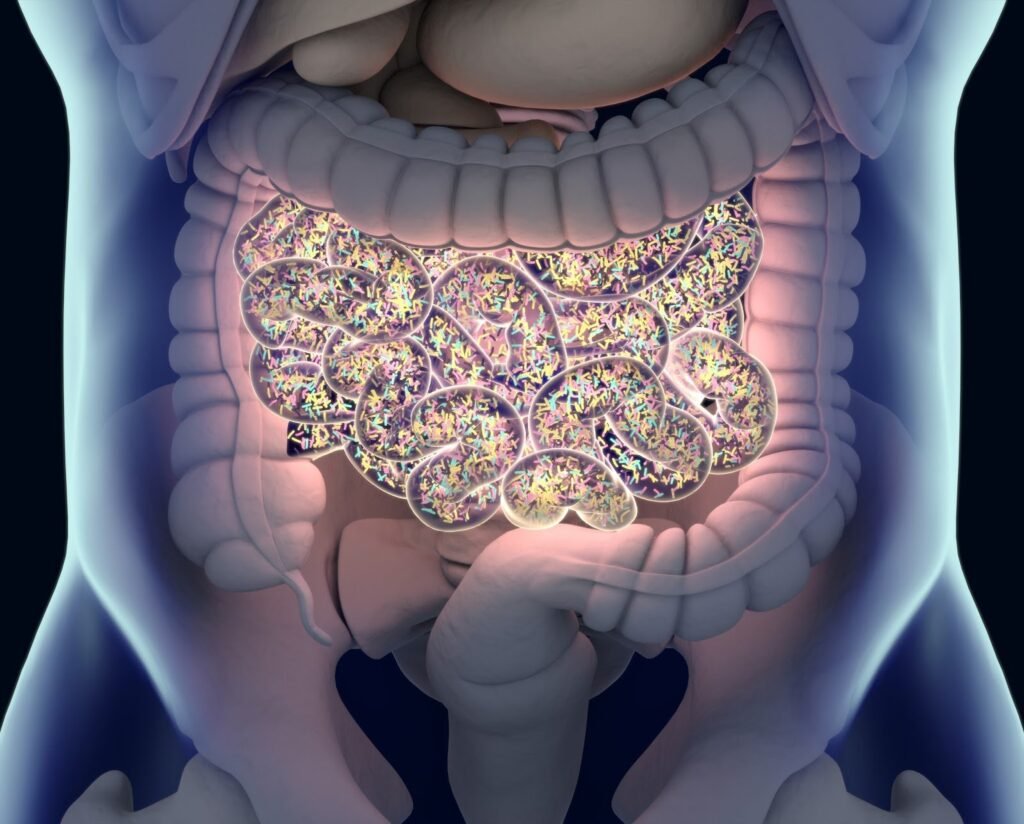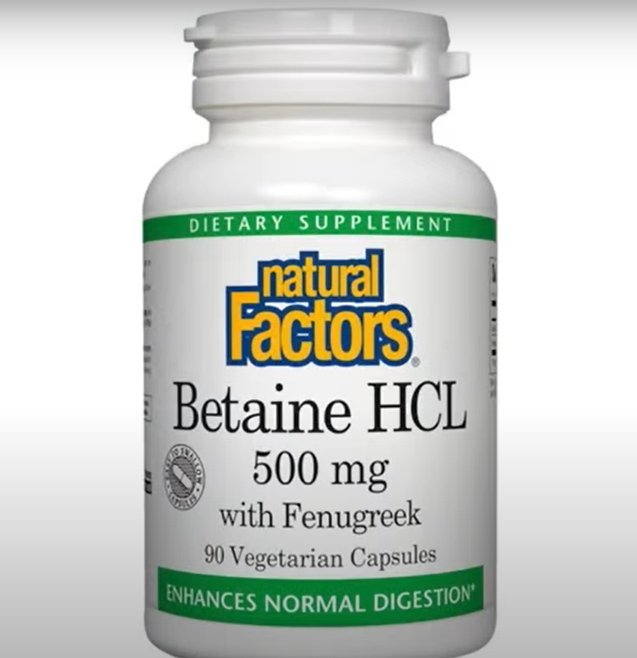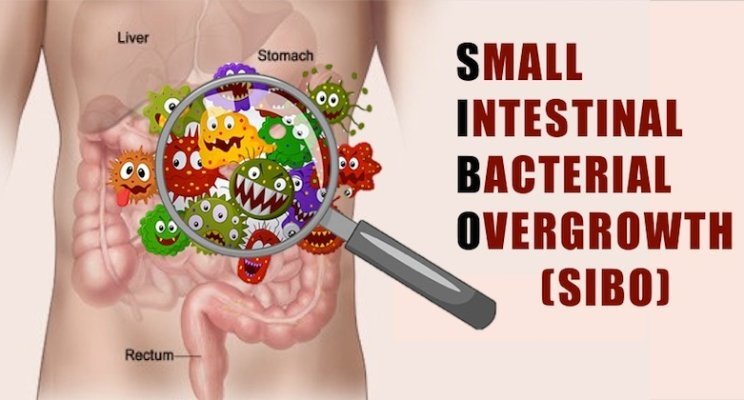Table of Contents
Small Intestinal Bacterial Overgrowth (SIBO) is a common yet often overlooked condition that can significantly impact your health and well-being. This article delves into the intricate relationship between SIBO and nutrient deficiencies, exploring how this condition can rob your body of essential vitamins and minerals. We’ll uncover the root causes of SIBO, from surgical complications to insufficient stomach acid, and provide practical, actionable steps to combat this digestive disorder.
Whether you’re struggling with unexplained nutritional deficiencies or seeking to optimize your gut health, this comprehensive guide offers valuable insights and strategies to help you reclaim your digestive wellness.
SIBO can steal your nutrients and damage your health

So today we’re talk about how SIBO can steal your nutrients. SIBO is small intestinal bacterial overgrowth. Basically, that is this: normally your flora, your good friendly bacteria should be on the large intestines right through here, but when it gets into the small intestines it becomes this.
When you eat, these microbes start fermenting carbohydrates. They start eating up your nutrients, especially B12, iron, and bile. Bloating, abdominal pain, and gas are just one side effect, but a bigger side effect is the nutritional deficiencies.
When you’re deficient in B12, you can have all sorts of things from serious neurological issues, shooting stabbing pain to anemia, and the list goes on and on. And then iron anemia, fatigue, and when you’re deficient in bile, you no longer can digest your fats and you can’t extract fat-soluble vitamins.
So you become deficient in vitamin A, vitamin D, vitamin E, and vitamin K as well as essential fatty acids. And there’s so many symptoms that are associated with those nutrients.
Summary:
- SIBO causes bacteria to overgrow in the small intestine
- Microbes eat up nutrients, especially B12, iron, and bile
- Nutritional deficiencies lead to various health issues
- Symptoms include bloating, pain, fatigue, and vitamin deficiencies
what causes SIBO
What causes SIBO? Well, it could come from many different things. One being some complication after surgery because they structurally altered your digestive system, and sometimes that physical alteration allows the bacteria to escape going backwards into the small intestine where you have this huge problem.
It could also come from not having enough stomach acid. Normally in the stomach, the pH should be between one and three. This is very, very acidic, and one of the big purposes of having a really strong acidic stomach is to kill off microbes.
So if you don’t have that acid, the microbes that come from the food go into the stomach and invade the small intestine and start to multiply and start living down here.
Summary:
- SIBO can be caused by complications after surgery
- Lack of stomach acid is another major cause
- Low stomach acidity allows microbes to invade the small intestine
what you can do about it

Now, what do you do about this condition? Number one, you need to increase the acidity of your stomach. Very, very important. I would start with something called betaine hydrochloride. You can get them in pills. I would take at least five before each meal. I would also take apple cider vinegar as well on a regular basis.
You can even get pills that combine apple cider vinegar powder with betaine hydrochloride and take them together. That will start helping this area right here.
Number two, you want to do intermittent fasting. This gives your digestive system a chance to reset and clean out some of the food for the microbes and allow the transit time and the food to kind of get through down into the small intestine through here.
Now one of the things that happens when you do intermittent fasting is you have this kind of this washing effect of the food back into the large intestine which happened from these little cilia hairs. So you get this cleaning effect if you could do intermittent fasting long enough. Very, very important compared to eating so frequently. If you’re not doing intermittent fasting, I believe you can never fully handle this condition.
Next thing is to avoid prebiotics, and I’m talking about fiber. Do not consume fiber, and I’m talking about vegetables as well, for at least a month to six weeks because guess what? These microbes live on that fiber. They’ll ferment the fiber and you’ll get gas.
And that also goes for probiotics. Don’t take probiotics because we’re trying to avoid adding more bacteria. You already have too much bacteria, and the microbes that are in there don’t like to be in there and you have unfriendly ones as well.

So this huge competition and definitely don’t consume something that combines both of these, a pre and a probiotic together. That would be like sauerkraut. That would really create a bloating effect.
The last thing I would recommend is some type of herbal antibiotic. I mean, you can do oregano, thyme, clove, garlic, and that will create an environment that’s very antimicrobial. So that’s what you want.
Summary:
- Increase stomach acidity with betaine hydrochloride and apple cider vinegar
- Practice intermittent fasting to reset the digestive system
- Avoid prebiotics and fiber for 1-6 weeks
- Don’t take probiotics
- Use herbal antibiotics like oregano, thyme, clove, and garlic
In summary, I want to emphasize that this condition is actually way more common than you might think. And number two, one of the big problems with this condition is the nutrition deficiencies that a lot of people don’t realize that could be creating symptoms that you’re not aware of.
So those nutritional deficiencies are not coming because you’re not eating certain foods, they’re coming because the microbes are actually eating them up and they’re not giving them to you.
Now there’s a lot more to this as far as getting tests to determine if you have it or not.
Summary
- SIBO stands for small intestine bacterial overgrowth. Here’s what happens: normally, your friendly bacteria live in your large intestine. But if they migrate to your small intestine, the microbes start fermenting your carbohydrates and eating your nutrients — especially B12, iron, and bile.
- Bloating, abdominal pain and gas are some of the side effects, but the most consequential one is nutritional deficiencies. When you’re deficient in B12, you could have serious neurological issues, shooting, stabbing pain, and anemia among other symptoms.
- An iron deficiency will also cause anemia as well as fatigue. And if you’re too low in bile, you can’t digest fats thus you’re unable to extract fat-soluble vitamins such as vitamin A, vitamin D, and vitamin E as well as vitamin K and essential fatty acids.
SIBO can develop because of many things. One is if your digestive system was surgically altered, allowing the bacteria to go into the small intestine. Or it can occur if you don’t have enough stomach acid to kill off microbes, which arrive with your food then can pass through to the small intestine.
Here’s what you can do if you have SIBO:
● Increase your stomach acid. Start by taking betaine hydrochloride, in pill form. Take at least five before each meal.
● Take apple cider vinegar regularly. You can get pills that combine betaine hydrochloride with apple cider vinegar.
● Do intermittent fasting to give your digestive system a chance to reset and clean itself out. When you fast, your food tends to be washed into the large intestine by the hair-like cilia in your bowel. I believe you can never fully handle SIBO unless you do intermittent fasting.
● Avoid prebiotics; that is, fiber, for at least a month to six weeks. Yes, I include not eating vegetables in this recommendation. Microbes will ferment the fiber.
● Avoid probiotics too, as part of keeping down your microbe numbers. And definitely don’t take products that combine pre-and probiotics!
● Take an herbal antibiotic such as oregano, thyme, or cloves to create an antimicrobial environment.
SIBO is way more common than you may know; and, one of the major problems with it is the nutritional deficiencies it can create, which will damage your health.
DATA
Download My FREE guide: First Signs of a Nutrient Deficiency
FAQ
How to absorb nutrients with SIBO?
Absorbing nutrients with SIBO can be challenging due to the overgrowth of bacteria in the small intestine, which can interfere with nutrient absorption. However, there are several strategies that can help improve nutrient absorption:
- Treat the underlying cause of SIBO: Addressing the root cause, such as structural abnormalities or motility disorders, is crucial for managing SIBO and improving nutrient absorption[1][3].
- Take antibiotics: Antibiotics are the primary treatment for SIBO, as they help reduce the bacterial overgrowth in the small intestine[3]. This can improve nutrient absorption by restoring the balance of gut flora.
- Adopt a low-FODMAP diet: Restricting the intake of fermentable carbohydrates (FODMAPs) can help alleviate symptoms like bloating and diarrhea, which can interfere with nutrient absorption[3].
- Consider supplementation: Patients with SIBO may require supplementation of specific nutrients they are deficient in, such as vitamins A, B12, D, E, calcium, and magnesium[3][5].
- Use medium-chain triglycerides (MCTs): MCTs may be helpful for patients experiencing steatorrhea (excess fat in stool), which can lead to malabsorption of fats and fat-soluble vitamins[5].
How does SIBO cause nutrient deficiency?
- Malabsorption: The overgrowth of bacteria in the small intestine can damage the intestinal lining and reduce the absorptive capacity of the microvilli, leading to malabsorption of nutrients[4].
- Bacterial consumption: The overgrowing bacterial populations can consume more than their fair share of certain nutrients, such as vitamins B1, B3, and B12[5].
- Inflammation: SIBO can cause inflammation in the intestinal lining, further impairing nutrient absorption[4].
- Diarrhea: Chronic diarrhea associated with SIBO can lead to the rapid transit of food through the digestive tract, reducing the time available for nutrient absorption[4][6].
- Maldigestion: SIBO can impair the digestion of macronutrients like fats, carbohydrates, and proteins, leading to malabsorption[5].
What is the most effective treatment for SIBO?
The most effective treatment for SIBO typically involves a combination of approaches:
- Antibiotics: Antibiotics are the primary pharmacological treatment for SIBO. Common antibiotics used include rifaximin, neomycin, metronidazole, and amoxicillin-clavulanate[3]. Repeat courses may be necessary for some patients.
- Dietary changes: Adopting a low-FODMAP diet can help alleviate symptoms like bloating and diarrhea[3][5]. However, elimination diets should be used judiciously to avoid exacerbating nutrient deficiencies.
- Addressing underlying causes: Treating the underlying cause of SIBO, such as structural abnormalities or motility disorders, is crucial for long-term management[1][3].
- Herbal antimicrobials: In some cases, herbal antimicrobials may be used in addition to or instead of antibiotics to reduce bacterial overgrowth[5].
- Prokinetic agents: Medications that stimulate intestinal motility, such as low-dose erythromycin or prucalopride, may be used to prevent SIBO recurrence[3].
What kills SIBO naturally?
While there are some natural approaches that may help manage SIBO, it’s important to note that they are not as well-studied as conventional treatments:
- Herbal antimicrobials: Certain herbs and spices, such as berberine, oregano oil, and allicin from garlic, have been shown to have antimicrobial properties and may help reduce bacterial overgrowth[5]. However, their effectiveness compared to antibiotics is unclear.
- Probiotics: Some studies suggest that certain probiotic strains, such as Saccharomyces boulardii and Bifidobacterium, may help improve symptoms and reduce bacterial overgrowth in SIBO[5]. However, more research is needed.
- Digestive enzymes: Supplementing with digestive enzymes may help improve nutrient digestion and absorption in SIBO patients[5].
- Ginger: Ginger has been shown to have anti-inflammatory and prokinetic properties, which may help manage SIBO symptoms[5].
It’s important to note that while these natural approaches may be helpful adjuncts, they are not a substitute for conventional treatments like antibiotics and dietary changes. Always consult with a healthcare professional before starting any new treatment regimen for SIBO.
SIBO symptoms
The most common symptoms of SIBO include:
- Bloating and abdominal distension[1][4][6]
- Abdominal pain or discomfort[4][6]
- Diarrhea[1][4][6]
- Constipation[6]
- Flatulence[1][3]
- Nausea and vomiting[6]
- Fatigue and weakness[4][6]
- Weight loss[4][6]
These symptoms can vary in frequency and severity depending on the degree of bacterial overgrowth and the underlying cause of SIBO[4]. It’s important to note that SIBO symptoms can be nonspecific and overlap with other gastrointestinal conditions, making it difficult to diagnose based on symptoms alone[1][4].
SIBO treatment
The treatment for SIBO typically involves a combination of the following approaches:
- Antibiotics: Antibiotics are the primary pharmacological treatment for SIBO. Common antibiotics used include rifaximin, neomycin, metronidazole, and amoxicillin-clavulanate[3]. Repeat courses may be necessary for some patients.
- Dietary changes: Adopting a low-FODMAP diet can help alleviate symptoms like bloating and diarrhea[3][5]. However, elimination diets should be used judiciously to avoid exacerbating nutrient deficiencies.
- Addressing underlying causes: Treating the underlying cause of SIBO, such as structural abnormalities or motility disorders, is crucial for long-term management[1][3].
- Herbal antimicrobials: In some cases, herbal antimicrobials may be used in addition to or instead of antibiotics to reduce bacterial overgrowth[5].
- Prokinetic agents: Medications that stimulate intestinal motility, such as low-dose erythromycin or prucalopride, may be used to prevent SIBO recurrence[3].
- Nutritional support: Patients with SIBO may require supplementation of specific nutrients they are deficient in, such as vitamins A, B12, D, E, calcium, and magnesium[3][5].
It’s important to note that SIBO can recur, and ongoing management may be necessary to prevent flare-ups[3]. Working closely with a healthcare professional is essential for developing an effective treatment plan.
When does SIBO die-off start?
The term “die-off” refers to the temporary worsening of symptoms that some patients experience when starting treatment for SIBO. This occurs due to the rapid die-off of the overgrown bacteria, which can release toxins and cause an inflammatory response[5].
The timing of when die-off starts can vary depending on the individual and the treatment approach:
- Antibiotics: When using antibiotics, die-off symptoms may begin within the first few days of starting treatment as the antibiotics start to kill off the excess bacteria[5].
- Herbal antimicrobials: With herbal antimicrobials, die-off symptoms may start a bit later, often within the first week or two of treatment, as the herbs work to reduce bacterial overgrowth[5].
- Dietary changes: Adopting a low-FODMAP diet can also trigger die-off symptoms as the bacteria are starved of their preferred food sources[5].
It’s important to note that not all patients experience die-off symptoms, and the severity can vary. If die-off symptoms are severe or persistent, it’s best to consult with a healthcare professional to determine if adjustments to the treatment plan are needed.
What to eat while taking Rifaximin for SIBO
While taking rifaximin for SIBO, it’s important to follow a diet that supports the treatment and helps manage symptoms. Here are some general guidelines for what to eat:
- Focus on low-FODMAP foods: Restrict your intake of fermentable carbohydrates (FODMAPs) to help alleviate symptoms like bloating and diarrhea[3][5]. Examples of low-FODMAP foods include:
- Fruits: Bananas, blueberries, grapes, kiwi, oranges, and strawberries
- Vegetables: Carrots, cucumbers, lettuce, potatoes, and tomatoes
- Grains: Gluten-free breads and cereals, oats, and quinoa
- Proteins: Eggs, fish, poultry, and tofu
- Dairy: Lactose-free milk, hard cheeses, and yogurt
- Stay hydrated: Drink plenty of water and herbal teas to support digestion and prevent constipation[5].
- Eat smaller, more frequent meals: Smaller meals can be easier to digest and may help prevent symptoms like bloating and abdominal discomfort[5].
- Consider probiotic-rich foods: While the evidence is mixed, some probiotic-rich foods like kefir, sauerkraut, and kimchi may help support gut health during treatment[5].
- Avoid trigger foods: Steer clear of foods that tend to worsen your symptoms, such as high-fat or fried foods, alcohol, and caffeinated beverages[5].
It’s important to work closely with your healthcare provider or a registered dietitian to develop a personalized diet plan that meets your individual needs and supports your SIBO treatment.
How long does SIBO last untreated
- Chronic symptoms: Without treatment, the symptoms of SIBO, such as bloating, abdominal pain, diarrhea, and malabsorption, can continue indefinitely[4][6].
- Nutrient deficiencies: Over time, the malabsorption of nutrients caused by SIBO can lead to vitamin and mineral deficiencies, such as vitamin B12, iron, and fat-soluble vitamins[4][5].
- Malnutrition and weight loss: Severe malabsorption and nutrient deficiencies can result in malnutrition and unintentional weight loss[4][6].
- Complications of underlying conditions: SIBO can exacerbate the symptoms and complications of underlying conditions that predispose individuals to SIBO, such as Crohn’s disease, diabetes, and scleroderma[1][4].
- Increased risk of small intestinal cancer: While rare, untreated SIBO may increase the risk of small intestinal cancer, particularly in individuals with a history of Crohn’s disease or celiac disease[4].
It’s important to note that the duration of untreated SIBO can vary depending on the underlying cause, the severity of the condition, and the individual’s response to the overgrowth of bacteria. Seeking prompt medical attention and following a treatment plan prescribed by a healthcare professional is crucial for managing SIBO and preventing long-term complications.
Still bloated after SIBO treatment
If you are still experiencing bloating after completing SIBO treatment, it may be due to several factors:
- Incomplete eradication of bacteria: In some cases, the initial treatment may not have fully eliminated the bacterial overgrowth, leading to persistent symptoms like bloating[3].
- Recurrence of SIBO: SIBO can recur, especially if the underlying cause, such as a structural abnormality or motility disorder, has not been adequately addressed[1][3].
- Ongoing dietary triggers: Certain foods, even if they are low in FODMAPs, may still trigger bloating in some individuals with SIBO[5].
- Delayed gastric emptying: Slow stomach emptying, known as gastroparesis, can contribute to ongoing bloating and discomfort, even after SIBO treatment[4].
- Irritable bowel syndrome (IBS): Some patients with SIBO may develop IBS-like symptoms, which can persist even after the bacterial overgrowth has been treated[4].
If you are still experiencing significant bloating after completing SIBO treatment, it’s important to consult with your healthcare provider. They may recommend additional testing, such as a hydrogen breath test, to assess the effectiveness of the treatment and determine if further interventions are needed. Adjusting your diet, trying a different antibiotic regimen, or addressing any underlying conditions may help resolve persistent bloating.




